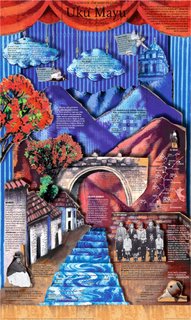 Arguedas's Los ríos profundos often repeats many of its central concerns, producing a series of doubled or multiple figures that show different sides to or perspectives on very similar issues.
Arguedas's Los ríos profundos often repeats many of its central concerns, producing a series of doubled or multiple figures that show different sides to or perspectives on very similar issues. For instance, there is a complex relation between the novel's various paternal figures: el viejo; the narrator's father; and Father Linares. El viejo demonstrates authority without tenderness; Ernesto's father, tenderness without authority; and Linares, the director of the boarding school in which much of the book is set, combines authoritarianism with, at times, genuine care for his charges.
In the end, as part of his progress into adulthood, Ernesto will reject all three, at the point at which they coincide in insisting that he stay at the Abancay school. He therefore rejects all paternalism, though not without having seen its benefits and seductions.
In this regard, I now think I was wrong in my last entry to identify so quickly the son's attitude to Cuzco's ruins with that of his father. Whereas the father expects a transcendent judgement at the end of time, and is prepared to wait for messianic justice when the archangel finally blows his trumpet, Ernesto perceives an immanent disturbance already alive in the Inca stones. Moreover, this difference also defines the ways in which the two move through social space: the father is solitary and nomadic, refusing commitment; the son wants always to participate, to submerge himself in the activity all around him.
And it is paternalism that's at stake in perhaps the most important of the novel's doublings: the two insurrections, first on the part of the mestizas, the chicheras who raid the store of salt hoarded by the landlords; the second by the colonos, the indigenous peasants who enter the town at the novel's climax.
Both insurrections are ultimately failures, but in rather different ways. The first fails because of the inadequacy of a model of political action premised on solidarity. The failure of the second (if it is indeed a failure) is much harder to explain, but precisely its inexplicability also indicates the limits of solidarity.
The chicheras' rebellion founders because it becomes a paternalistic exercise in solidarity with a social subject that remains stubbornly subaltern. The women march down to Patibamba with the intention of distributing salt among its indigenous inhabitants. In the process, they also constitute themselves as a people. What was once the "movement of the multitude, like a swelling river [oleaje]" (272) is regularized, regimented: "It was now a people that was following behind the mules, advancing at the pace of a dance [a paso de danza]" (280). And on reaching the colonos' residences, they attempt to integrate these people, the most oppressed of the oppressed, into what is now a popular uprising.
But the subalterns to whom this call to solidarity is addressed stubbornly refuse any such articulation. Just as Ernesto, in semi-anthropological guise, was greeted with little more than silence when he first explored the area, so likewise the hitherto triumphant chicheras here reach the limit of their hegemonic project:
"Come on out, mothers! We've brought you salt!" shouted one of the chicheras in Quechua.Eventually the indigenous women are prised out of their houses to receive the salt in their skirts, but no sooner has it been given out than they scurry back inside and shut themselves in. And it's not long after the townsfolk have departed from whence they came that the landlord orders his men to raid the colonos' houses and ensures that the salt is returned to the store.
"Mamakachuna! Mamakachuna!" called another.
The silence continued. [. . .]
"This is the people's salt, for you, mother!" exclaimed the chichera, gesturing to the bags of salt. Her voice turned tender and sweet. (281, 282)
The popular uprising turns out to be the most temporary of affairs, whose chief result is that in response the army are sent to Abancay, to bring order and root out the ringleaders. All the good intentions of solidarity leave but a fleeting sense of satisfaction and a more sustained resumption of repression.
No wonder that when the colonos themselves take matters into their own hands, in response to the threat of plague, it causes such astonishment: "It's a lie! They can't! They can't!" (450). The puzzle remains, therefore, as to what kind of rapport can be established in the absence of meaningful communication.

No comments:
Post a Comment